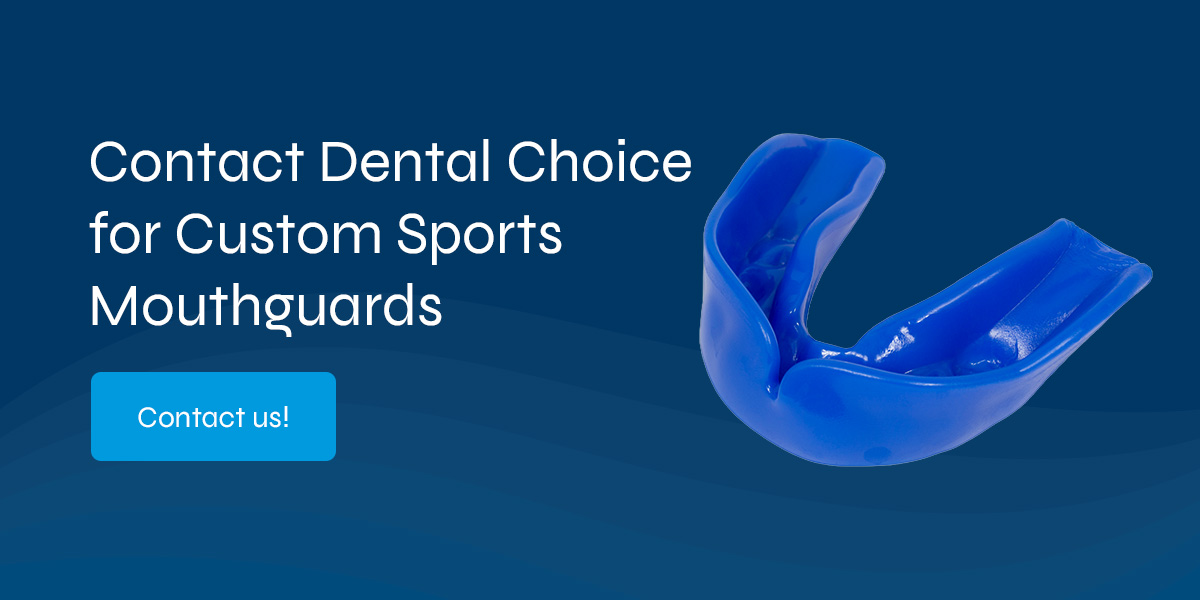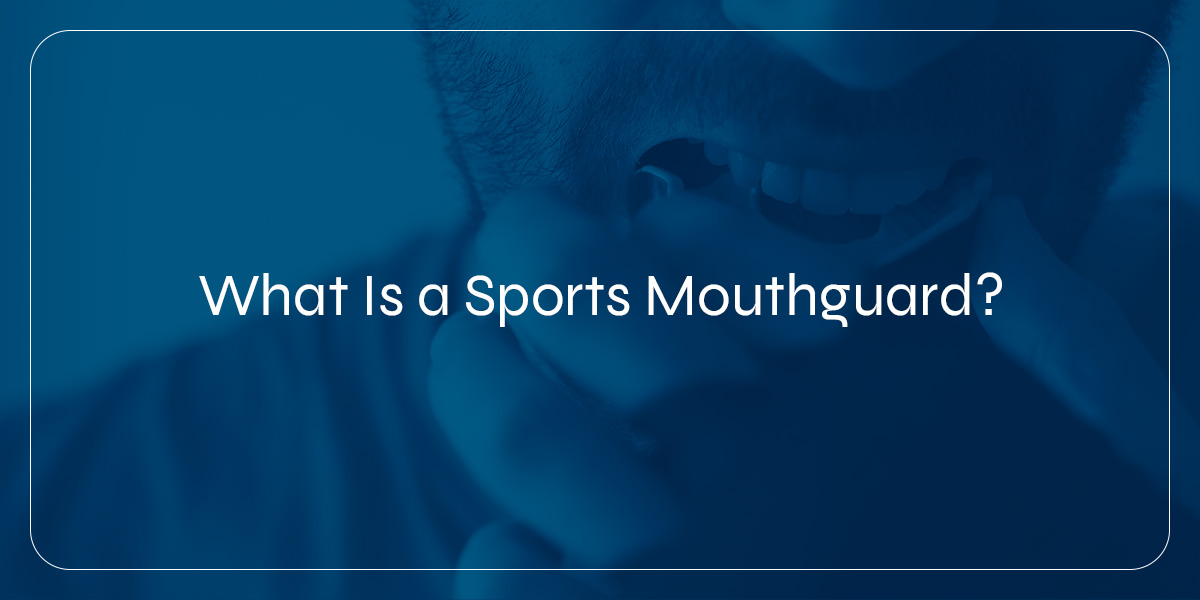
Mouthguards are a dental application worn over the top row of teeth. Its purpose is to prevent oral injuries by softening blows to the face and mouth area. Even though they are not mandatory in most sports, it is recommended to wear one when participating in sports that involve flying objects, body contact and falls. A sports mouthguard should fit snugly against the teeth for the most protection.
This simple piece of protective gear can prevent oral injuries. Dental emergencies can be pricey. But beyond the costs, dental and oral injuries are painful. A missing tooth can ache for days, and a broken jaw can be a source of pain for weeks. So, whether you are an athlete or have a child who participates in contact sports, mouthguards are a worthwhile investment.
Learn about the different types of mouthguards in sports and the benefits they have to offer athletes of all ages.
What Are the Different Types of Sports Mouthguards?
There are three primary different types of mouthguards. Each varies in cost, comfort and protection capabilities. While some types are more accessible, others are longer-lasting and more durable. However, all three forms provide some level of beneficial protection.
Stock Mouthguards
These are premade and available in various sizes. However, finding a comfortable fit is practically impossible because they are premade. Stock designs typically don’t fit very well and can feel bulky. Due to the improper fit, they can make speaking and breathing difficult. The design also lacks retention. Athletes need to bite down on guard continuously to keep it in place.
Even though stock mouthguards are the cheapest and most accessible, they provide the least protection. Athletes often cut these to alter them, making them slightly more comfortable. But this does reduce the protective qualities.
Boil-And-Bite Mouthguards
These are similar to stock mouthguards as they are premade, although they need to be softened in boiling water and bitten into. The soft plastic molds around the teeth and sets for a customized fit. Boil-and-bite designs are also accessible — you can find them in most sporting stores.
These mouthguards are usually made from ethylene-vinyl acetate (EVA). This flexible material has a rubber-like quality that can absorb significant impact force. While they provide a better fit, they are a bit more expensive than stock designs. They can also wear down quite quickly. So, you will need to replace them a few times a year.
Custom-Fitted Mouthguards
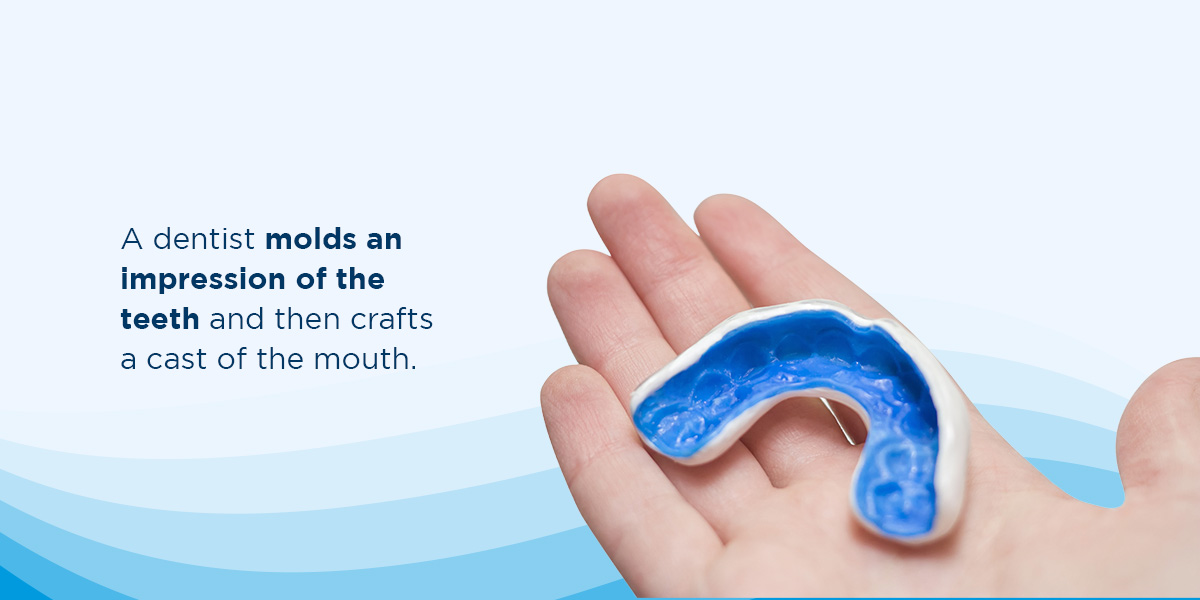
Custom-fitted mouthguards are a superior option. A dentist molds an impression of the teeth and then crafts a cast of the mouth. A thermoplastic mold material is then adapted over the cast to create the mouthguard. These are fully customized, providing a perfect fit. As a result of the snug fit, they offer maximum comfort and optimal protection from oral injuries.
When creating custom mouthguards, the dentist can perform an oral exam before fitting the guard. As a result, the dentist can design a mouthguard with additional protection in certain areas. For example, if missing teeth or cavities are a concern, the dentist will consider this when building the guard.
These sports guards are made from various materials. Vacuum foam is a popular material for single-layer mouthguards. Medical-grade thermal polymer is also a common custom mouthguard material. This plastic ensures optimal comfort and provides a snug fit that keeps it in place.
When comparing custom vs. over-the-counter sports mouthguards, custom fits are more expensive, but they offer the most protection and last the longest.
How Often Should Mouthguards Be Replaced?
How often you need to replace a mouthguard will depend on a few factors. First, the type of mouthguard will have the most significant influence. Stock designs generally only last a few wears, while boil-and-bite designs can last about one sporting season. Custom-fitting mouthguards can last several seasons. However, care and use will also impact how often it needs to be replaced.
Proper storage in a durable, ventilated container can help prevent damage. Keeping mouthguards away from hot water, steam, excessive sunlight and high temperatures is essential. The soft plastic or silicone can become brittle when exposed to high heat.
Mouthguards become less effective when they lose their thickness. So, it’s essential to recognize the signs it’s time for a replacement. If you notice cracks or imperfections, a deformed shape or a loose fit, you should invest in a replacement.
How to Keep Mouthguards Clean
Since mouthguards are worn in the mouth, keeping them clean is essential. Otherwise, bacteria in the mouth can build up, leading to bad breath and infections.
It’s vital to clean your mouthguard after each use. Rinse it with water directly after use and then wash it with toothpaste and a toothbrush. Gently scrub the entire surface and rinse with clean water. You can also use soap and water, mouthwash or baking soda. In addition, you should soak a mouthguard once a month using mouthwash or chemical cleaners like sodium hypochlorite.
In addition to routine cleaning, if it should fall to the floor during use, it’s best to clean it before wearing it again. Never share a mouthguard with anyone else.
Why Sports Mouthguards Are Important
Sports-related injuries account for about 40% of all dental injuries in the U.S. The American Dental Association (ADA) recommends that anyone participating in contact sports or other activities that risk oral injury should wear a protective mouthguard for sports.
Here are the primary benefits of sports mouthguards.
Prevent Tooth Injury
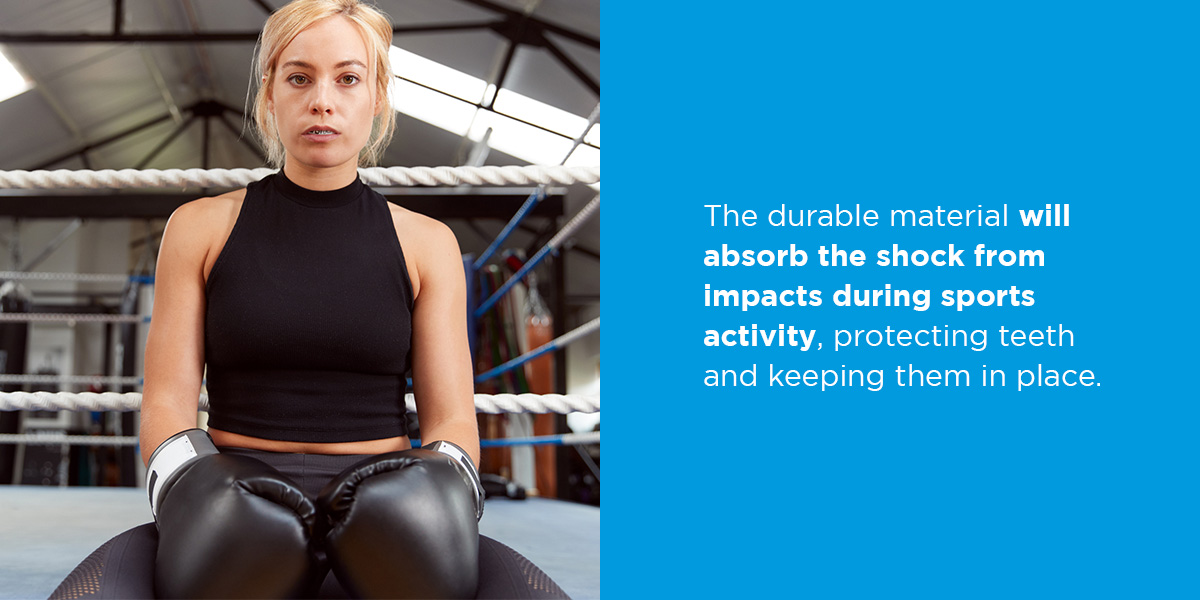
Chipped, broken, misaligned and missing teeth are common dental injuries mouthguards can prevent. While dental injuries like tooth fractures require dental attention, keeping tooth fragments that can help the dentist rebuild the broken or chipped tooth is vital.
In avulsion injuries, when the entire tooth and root are knocked out, storing the tooth is essential. Note that it’s not recommended to pick up a tooth by the root. Because the tooth will start dying quickly, transport it in the athlete’s mouth or a damp cloth. Luxation injuries can occur when the tooth is still in the socket, although in the wrong position. With this, the athlete must visit their dentist to reposition the tooth safely.
There is much less risk of these injuries when athletes wear mouthguards. The durable material will absorb the shock from impacts during sports activity, protecting teeth and keeping them in place.
Protect Dental Restorations
Wearing a mouthguard is recommended when athletes have dental restorations like braces, crowns, fillings and bridges. A blow to the face or mouth can cause severe injury when dental restorations are in place. Mouth injuries with braces can lead to missing teeth and severe dental damage. Crowns and fillings can damage teeth with minimal impact injuries.
Wearing a mouthguard can protect dental restorations and aid in the prevention of dental injuries during contact sports. A custom fit is the best option for anyone with dental restorations, as the mouthguard must perfectly accommodate the structure of the teeth.
Prevent Soft Tissue Injury
Teeth are not the only area of the mouth that benefits from the protection a mouthguard can provide — soft tissue like gums, tongue, lips and cheeks are also less prone to injury. During injury impact, the teeth can cut through lip, tongue and cheek tissue, along with gum bruising and swelling.
Soft tissue injuries to the mouth often require medical attention. A laceration to the tongue can lead to speech impediments, disfigurement and loss of function. Lip and cheek lacerations can also cause disfiguring scarring. A well-fitting mouthguard will protect teeth and surrounding soft tissue.
Prevent Serious Injury
Numerous studies have shown that mouthguards can help prevent serious injuries. Beyond broken and missing teeth, they can also help minimize the risk of serious jaw dislocation, fracture injuries and severe lacerations to the soft tissue of the lips, tongue and cheeks. According to the ADA, the risk of mouth injury is reduced by 60 times when wearing a mouthguard.
There is also some evidence that suggests wearing a mouthguard may reduce the risk of severe head injury. In a study evaluating ice hockey players, those who wore sports guards at the time of an injury were less likely to sustain a concussion.
Additionally, mouthguards can prevent temporomandibular joint (TMJ) injuries during contact sports. This study also found that they contribute positively towards overall dental health and may even improve athletic performance.
What Sports Require Mouthguards?
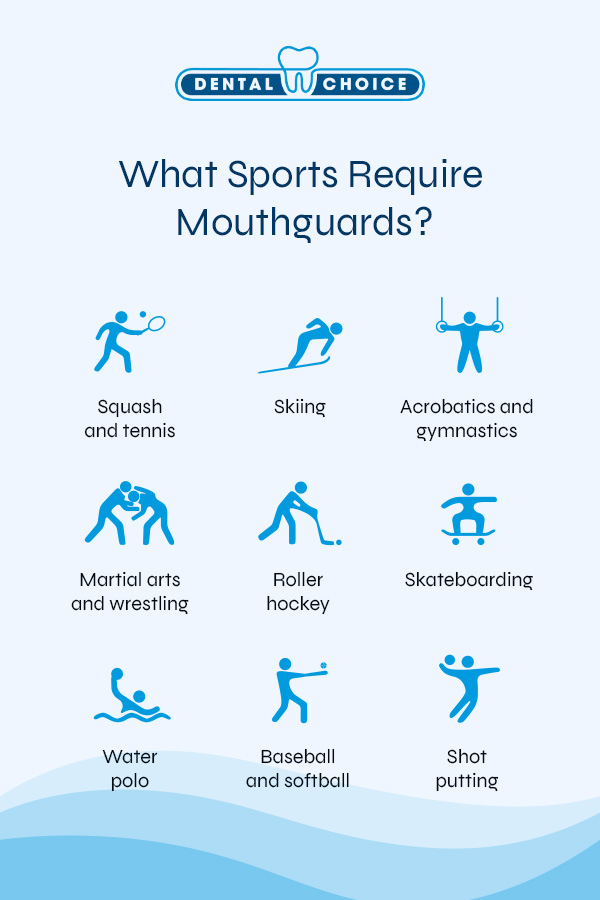
The U.S. National Collegiate Athletic Association requires the use of mouthguards for certain contact sports, including boxing, field and ice hockey, football and lacrosse.
Even though mouthguards are not mandatory in all contact sports, wearing one is still wise when participating in any activity where facial and oral injuries are possible. Here are just some additional types of sports where athletes should wear sports guards:
- Acrobatics and gymnastics: Athletes are exposed to body contact and fall injuries in these sports.
- Martial arts and wrestling: Facial and oral injuries are as common in martial arts and wrestling as in boxing.
- Roller hockey: This sport has similar risks to ice and field hockey. Athletes can experience injury from flying balls and hockey sticks and body impact from other players.
- Water polo: Because water polo uses a hard ball, players should wear a mouthguard.
- Shot putting: Steel shot put balls are incredibly heavy, weighing 8.8 to 16 pounds. As a result, a blow to the face can be catastrophic.
- Skateboarding: Fall injuries are common in skateboarding as athletes often misjudge the rails or slip for other reasons.
- Skiing: Skiers are at risk of head injuries from falls. Wearing a mouthguard and protective headgear is essential in this sport.
- Squash and tennis: Tennis balls may seem lightweight and harmless. However, the average speed of a tennis ball hit by a professional player is about 75 mph. Even when playing tennis recreationally, the impact of a tennis ball can be significant.
- Baseball and softball: Softballs and baseballs are quite heavy. These balls can fly at average speeds of 90 mph or faster because they are heavier than tennis balls. A blow to the face can lead to severe oral injuries.
Whether participating in these sports recreationally or professionally, wearing the recommended protective gear is essential. Most of these sports require additional protective gear like knee and elbow guards, helmets and gloves.
Can Mouthguards Improve Dental Health?
Mouthguards can help preserve the natural structure of teeth and prevent injuries that increase the risk of developing severe oral health issues later on. However, they can also prevent wear and tear on teeth caused by grinding and jaw clenching. These habits impact teeth, gum and jaw health.
For this reason, dentists sometimes recommend using a mouth or night guard at night while sleeping, when grinding and clenching become subconscious actions. In these cases, they can improve overall dental health. Certain medical conditions like sleep apnea, snoring and TMJ disorders are also treated with night guard use.
With sleep apnea and snoring, a custom-made night guard can help shift the jaw to keep airways open. Regarding TMJ disorders, a mouthguard can help keep the jaw stable.
For a mouthguard to provide these benefits, a custom fit is vital. Stock and boil-and-bit mouthguards are not suitable for daily use and won’t provide as much dental support. It’s essential to rely on a professional dentist when fitting night guards to treat any health condition.
Where to Buy a Mouthguard for Sports
Even though you can find stock mouthguards at most pharmacies and sporting outlets, these designs provide less protection than boil-and-bit and custom-fitting ones. Unless nothing else is available, opting for a custom fit is best.
Boil-and-bite mouthguards are also available at most sporting outlets, and you can purchase them online. These sports guards provide medium protection and a more comfortable fit than stock designs. However, custom-fitting mouthguards are a worthwhile investment. Because these sports guards don’t need to be replaced as often, they offer great value for money in the long run.
If you opt for a custom-fitting mouthguard, you need to visit the dentist. Dental Choice is a family dentist that’s been in business for over three decades. We provide quality dental services to several Edmonton, Calgary and Red Deer locations.
Contact Dental Choice for Custom Sports Mouthguards
Finding the right family dentist can make a major difference to your dental health. At Dental Choice, our team of dedicated dentists will listen to your needs to craft a mouthguard that fits your unique dental structure perfectly. Our mouth and nightguards are crafted from quality materials. Custom mouth and night guards require two consultations. During the first appointment, we’ll collect an impression of the top row of teeth, and during the second appointment, we’ll fit the guard to ensure it fits just right.
Whether you need a mouthguard for yourself or your kids, by choosing a custom-fitting mouthguard from Dental Choice, you can be confident that the sports guard will protect your or your child’s teeth and mouth from injury.
To book your first consultation, contact us online or find a location near you to make an appointment.
